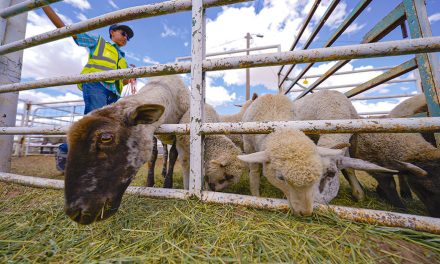
Letters: IEEFA has no business here
The Institute for Energy Economics and Financial Analysis, an Ohio-based activist group, has done everything it could to prevent the Navajo Generating Station from operating beyond 2019.
This group will never create jobs or bring prosperity to the Navajo people, and they have no business telling us how workers should be transitioned to other jobs.
I have worked in Kayenta for the past eight years and have been part of an extended effort to keep the mine and power plant online. These operations create skilled jobs for hundreds of workers and benefit every member of the Navajo Nation by generating millions of dollars of annual revenues that are used for essential tribal programs benefitting our schoolchildren, elders, veterans and others.
Many Navajo know first-hand how difficult it is for parents to work away from home. No one wants to leave their family behind only to live on the road out of a suitcase to make ends meet.
As the Navajo Nation moves forward, we should do so in the spirit of creating good, skilled jobs that will enable parents to remain on the reservation, strengthening our cultural awareness and keeping our families strong.
Myron Richardson
Page, Ariz.
Ranching program ‘making up laws’
On Friday, April 26, 2019, I received the tribal ranch temporary ranch usage grazing fee statement. The document reads: “Payment is due upon receipt of your invoice. Remit payment owed at your earliest convenience to avoid additional late fees.”
This payment invoice is four months late, the one before was three months late, and for years they have arrived one month late or more. The last two lease payment invoices I received, the tribe has increased my herd capacity by 10 and their letter states, “Should you have any question regarding your account please contact me.”
I’ve called and mailed written requests inquiring about the reason for the increases with no response. The Navajo Nation knows they can get away with increasing these leases because they are apparently not held accountable by anyone.
This they call sovereignty. This May is the 10-year anniversary of the attempted eviction of over 20 from the Navajo Nation ranch lease program. Some left quietly, only two of us ranchers filed an “intent to sue” after finding out there was corruption in the Navajo Nation Department of Agriculture leasing program.
The one other rancher filed a few days before me and went to court first. The Navajo Nation district court and Navajo Nation Supreme Court sided with the rancher in the first suit.
My suit never went to court, but the previous ruling stated that the ruling does not include Justin Yazzie or any other rancher, but it is obvious by their inaction they do not want a duplicate court ruling.
The Navajo Nation in 2009 removed the Navajo ranchers off the land for no reason, just as the U.S. government did to the Navajos in 1864. The Navajo Nation always stresses human rights to other non-members, but they violated our rights by not giving every rancher a hearing.
The tribe will not reduce herd capacities and are promoting overgrazing even during severe drought, because they say it’s a business, but leasing public land is not a business, it’s about protecting the Navajo land.
I am a fifth-generation livestock rancher and have been experiencing a lack of green grass because of the extreme drought conditions the last three years. Each year during the drought we have seen destruction due to overgrazing.
According to ranching consultants, we should be cutting herds in half during times of severe drought. I supplement feed just to maintain my small herd to break even and feed my grandchildren. I do this not as a profiteer but as a “way of life.”
In my opinion the four seasons of moisture ceased in 1996. Navajo Nation grazing fees continue to escalate from $4 to the $6 per animal, per month, that will take effect in 2020.
This is in contrast to the off-reservation public leasing, which is less than one third of this amount, and most of it on better land. Don’t our tribal leaders realize that when our ancestors returned to our homeland, the U.S. government kept the best portion within the four sacred mountains?
The Natural Resources Department members need to attend the New Mexico Indian Livestock Days at the Route 66 Casino on May 7-9 to find out themselves that if the natural resource is poor, the herd is poor. I commend the Navajo Nation Fish and Wildlife for reducing their hunting applications because of the harsh drought condition.
It’s frustrating to read in the newspapers recently regarding the Navajo Nation’s very powerful talk on sovereignty, Treaty Day of 1868, culture and tradition, human rights and protect the Navajo land way of life. I’ve been experiencing these words of wisdom since May of 2009. Our tribe only uses these words to benefit the government and use it to take advantage of the Navajo people.
The new administration has categorized priorities with agriculture and land being last, disrespecting our very basic foundation of existence. If we don’t recognize what Nature is telling us and continue making laws that contradict Mother Earth, due to the way they apply sovereignty to make up the law as they go along until it is corrected by the Navajo Nation common law court system, our tribe will remain morally bankrupt.
Justin D. Yazzie Jr.
Farmington, N.M.
To read the full article, pick up your copy of the Navajo Times at your nearest newsstand Thursday mornings!
Are you a digital subscriber? Read the most recent three weeks of stories by logging in to your online account.








 Highway 264,
Highway 264, I-40, WB @ Winslow
I-40, WB @ Winslow